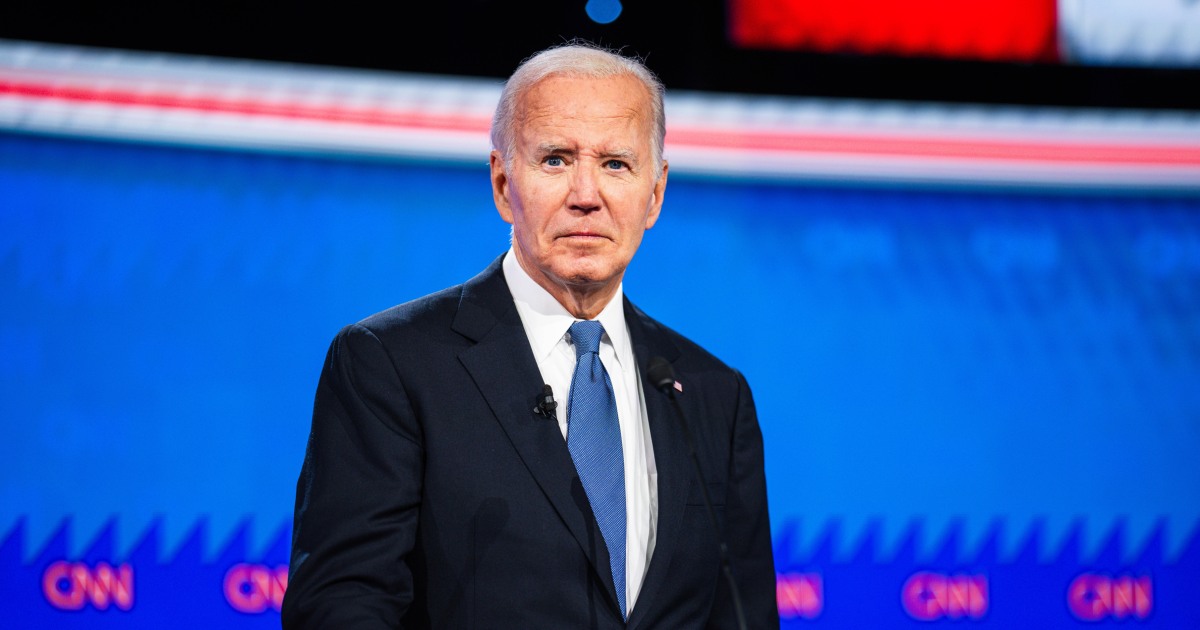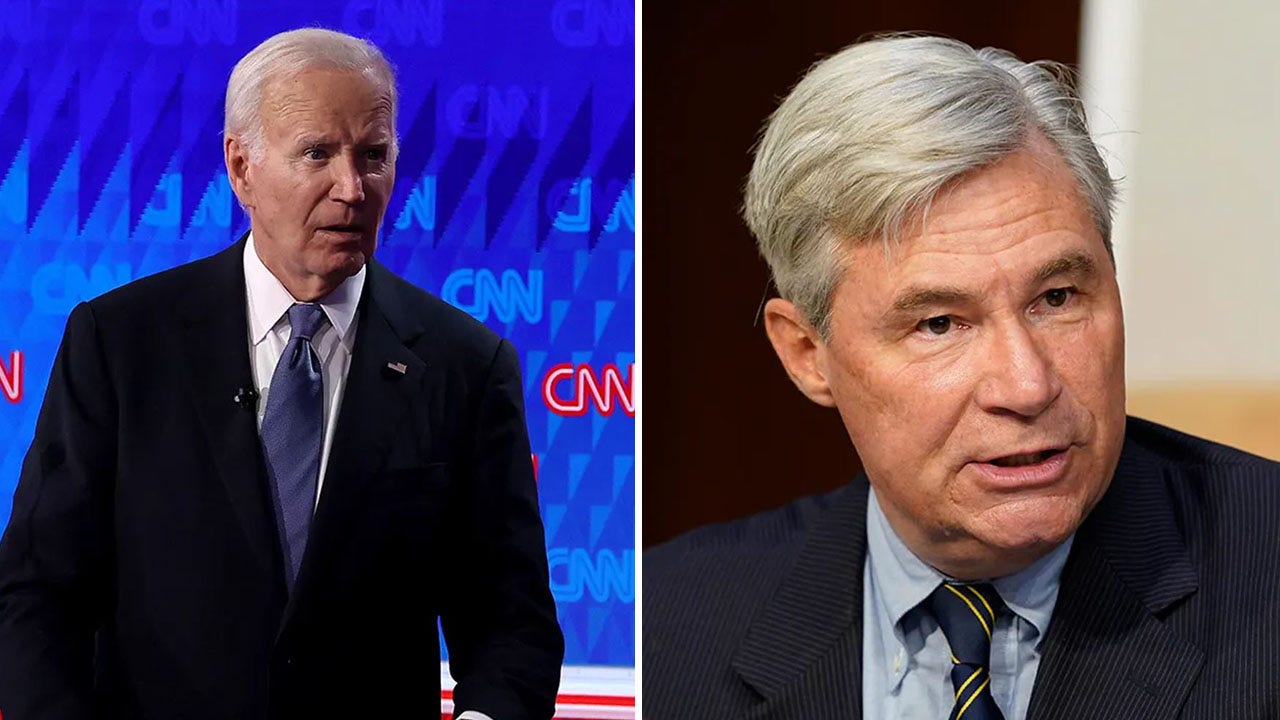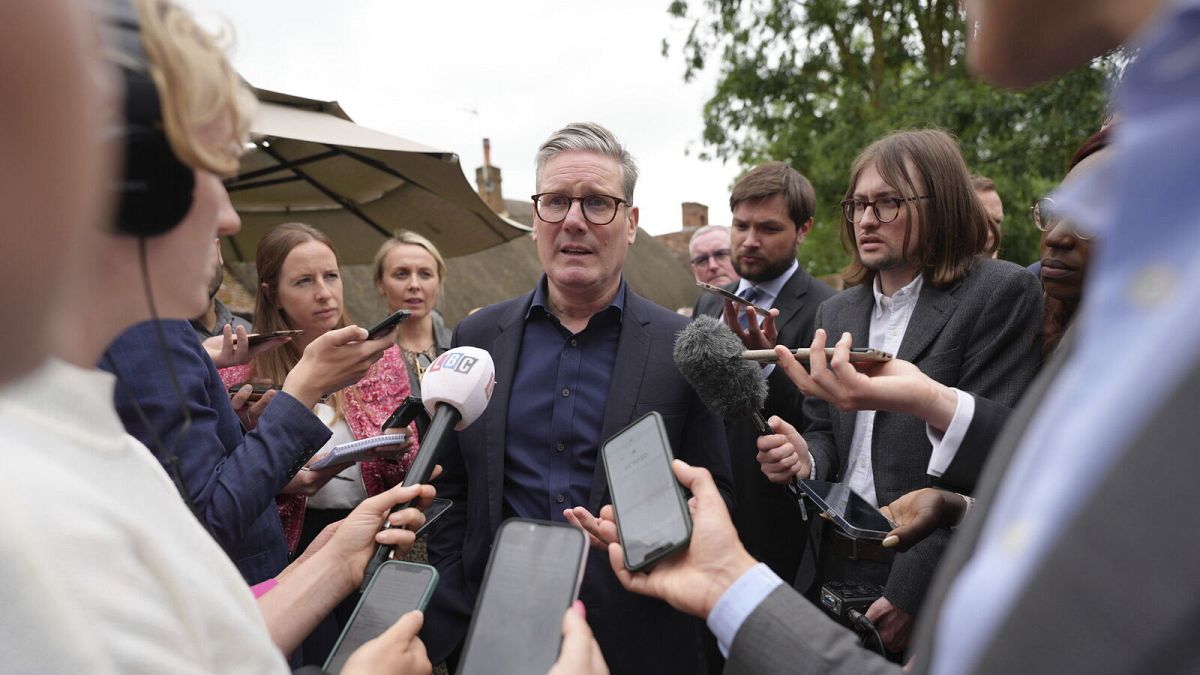Politics
Nigel Farage, Trump ally and political flamethrower, shakes up British parliamentary vote

In a sludgy, slow-motion trajectory, the pale yellow milkshake found its mark: Far-right political candidate and Donald Trump acolyte Nigel Farage, on the inaugural day of his insurgent campaign for a seat in the British Parliament.
But no display of airborne voter displeasure was going to prevent one of the country’s most gleefully polarizing public figures from shaking up what had until then been considered a fairly sedate contest between Britain’s two biggest parties. In a surprise announcement in early June, Farage inserted himself as the ruling Conservatives were already forecast to lose decisively to the left-leaning Labor Party.
Some observers believe the return of Farage, 60 — political flamethrower, a key architect of Brexit, leader of a small, stridently anti-immigration party — could lead to a MAGA-like takeover of the Conservative Party, which has played a preeminent role in British politics for nearly 200 years.
Nigel Farage, leader of the anti-immigration Reform U.K. political party, plays a game at an amusement arcade below his party’s office in Clacton-on-Sea, England.
And his high-profile presence re-introduces an insistently clamorous voice to what has lately been a nationalist-populist upswelling in Western Europe and beyond, one whose full import may soon become clear.
“He’s good at getting attention, and he sees himself as a disrupter, someone who wants to overthrow the established order,” said Mark Wickham-Jones, a political science professor at the University of Bristol. “There’s not much coherence to his policies, but in terms of his support, that really doesn’t matter.”
Public opinion polls suggest Farage’s party, Reform U.K., will come nowhere near victory in Thursday’s general election. But after seven straight losses, he appears poised to succeed — finally — in winning election to the House of Commons, the 223-year-old lower house of Parliament.
Farage, who hails from a leafy village on London’s outskirts, is making his eighth parliamentary run in Clacton-on-Sea, a down-at-the-heels seaside town whose jangling arcades, shuttered storefronts and scuffy, darting seagulls can lend it the air of a distorted funhouse mirror. (In Britain, parliamentary candidates do not have to live in their constituencies.)

Boys on bicycles hang out near the main street in Clacton-on-Sea. The town and its surrounding villages are afflicted by high unemployment and poverty.

People walk by one of the many amusement arcades near the beach in Clacton-on-Sea.
“Something is happening out there — momentum!” Farage recently told a group of sweaty, enthusiastic supporters at his tiny local headquarters, situated above one of the many garish amusement arcades lining a seaside street.
“It’s like millions of simultaneous conversations are going on, at the breakfast table, at the bingo hall, at the pub — ‘Oh my God, we were just talking about you!’” he said, sounding almost giddy.
In many ways, Clacton is an electoral venue tailored for Farage.
The town and its surrounding villages, while containing some affluent pockets, are afflicted overall by high unemployment and poverty rates. In the 2016 Brexit referendum, 70% of the constituency voted to leave the European Union. Two years earlier, Reform’s predecessor, the United Kingdom Independence Party, or UKIP, won a parliamentary race for the first time — in Clacton.
In a political pattern that has become familiar in the United States and continental Europe, voters in Clacton, which is home to relatively few migrants, tend to be far more vociferous than the general population in demanding that immigration be cut dramatically.
Farage “has been able to play on people’s fears,” Wickham-Jones said, “and concerns about identity — a sense that society has been changing rapidly.” Other politicians, he said, have struggled to articulate a counternarrative about the social benefits of immigration, or less drastic ways of curtailing it.

David Allum, right, canvasses for British politician Nigel Farage outside Reform’s office, above an arcade center in Clacton-on-Sea.
The Labor candidate in Clacton is a charismatic 27-year-old named Jovan Owusu-Nepaul, who was born in the English town of Nottingham and is of Jamaican and Ghanaian heritage. He is seen as having little chance of overtaking Farage, although some political observers believe his quick-witted, social-media-heavy campaign style marks him as someone who could ascend the national stage at some point.
On a Clacton side street, Pushkar Dhasmala, a 40-year-old immigrant from India, said he supported Owusu-Nepaul but knew that most of his neighbors did not.
“The care sector is dependent on immigrants,” said Dhasmala, who works in a privately run assisted-living facility. Farage’s opponent, he said, “understands the situation” faced by those newly arrived and trying to make a home in Britain.
Labor’s expected dominance in the national parliamentary vote bucks a recent trend of nationalist-populist success elsewhere in Europe. The party has been buoyed by a wave of public disaffection with the Conservatives, whose nearly 15 years in power spanned the pandemic and Britain’s chaotic exit from the European Union, formalized in 2020.
Over the years, the Conservatives imposed hard-edged austerity measures that have gutted Britain’s public sector, including the revered but deeply troubled National Health Service. The Conservative-held prime ministership changed hands repeatedly during the tussle to enact Brexit, culminating in the scandal-plagued reign of Boris Johnson, who stepped down in disgrace in 2022.
Johnson’s successors fared little better: First came the hapless Liz Truss, the shortest-serving leader in modern British history, whose 50-day tenure inspired memes of whether she would outlast a wilting head of lettuce, and current Prime Minister Rishi Sunak, who called the upcoming vote when it became clear that cratering Conservative support could plunge even further.

Nigel Farage plays an arcade game. The anti-immigration politician, who hails from a leafy village on London’s outskirts, is making his eighth parliamentary run in the down-at-the-heels seaside town of Clacton-on-Sea.
The reemergence of Farage — who jumped into the parliamentary race after first saying he would not run — coincides with bruising times for mainstream political leaders elsewhere in Western Europe.
In France, President Emmanuel Macron is trying to hold shut the far-right floodgates in two rounds of parliamentary voting finishing on July 7; Germany’s centrist government suffered a stinging rebuke when a far-right party notched second place in the country’s European parliament elections this month.
There has sometimes been a certain synchronicity in American and British politics — Brexit’s narrow approval came months before Trump’s 2016 presidential victory — and prominent Trump backers have taken delighted notice of far-right gains in France, Germany, Italy and elsewhere.
Before, during and after the former U.S. president’s turn in office, Farage worked strenuously to insert himself into the Trumpian orbit, albeit as something of a distant satellite.

Nigel Farage’s sloganeering echoes Donald Trump’s — “make Britain great again.”
In a recent interview with Britain’s ITV, Farage declared that Trump had likely “learned a lot” from his own incendiary, insult-laden speeches in the European parliament, where he previously held a seat — but added, magnanimously, that the tutelage went both ways.
Farage’s sloganeering echoes Trump’s — “make Britain great again” — and he relishes describing the country as being in a state of terminal decline and branding opponents “boring idiots.”
Trump, for his part, was an avowed fan of Brexit, and his campaign hinges on many of the same social divisions that animate Farage’s run: immigration, economic dissatisfaction and culture wars.
Some political commentators, and Farage himself, have suggested the voting results might leave him positioned to essentially capture a hollowed-out Conservative party — a scenario likened by some to events across the Atlantic, where Trump’s MAGA movement has seized control of the Republican establishment.
“Post election, there may be a bid for forces from Reform to stage some kind of takeover of the Conservatives, perhaps involving Farage if he is elected” as a member of Parliament, said Andrew Blick, a politics and contemporary history professor at King’s College London.
“I don’t know if this will be successful, but if it were, the Conservatives would look more like the Trump-era Republicans,” he said. That would leave a victorious Labor party and prospective new prime minister, Keir Starmer, facing a far more extremist and intransigent political opposition.
For all the fandom that can be seen out on the campaign trail, Farage triggers strong negative pushback from across much of the political spectrum. He has been pilloried for saying NATO provoked Russia’s war against Ukraine, for blatantly misogynistic remarks, and for repeated expressions of what critics call thinly veiled racist sentiments.
“You don’t have to watch sheepdog trials to hear a dog whistle,” former Conservative Prime Minister David Cameron said of Farage, speaking to the Times of London.
On the day Farage began his campaign in Clacton, a young female onlooker, who was later arrested, splattered him with a milkshake on the steps of a well-known seaside pub, the Moon and Starfish. This was not the first milkshaking of Farage’s career, and he handled the incident with a degree of aplomb, grinning for cameras later that day with an order of banana milkshakes in hand.
Three weeks later, though, the man who made bellicosity his political trademark was clearly still harboring a grudge.
“Politics has changed,” he said. “People hurl things at you.”
His divisiveness was attested to by a Clacton couple who were dining on a recent afternoon on the terrace of the pub where the milkshake episode occurred.
Paula Bracegirdle, a part-time cook who said she hoped to retire soon, had qualms about Farage — “a bit extreme, I think,” she said. But her husband, Paul, 60, who works part-time with elderly people with dementia, called him a truth-teller.
“I think he’s straight with what he says,” he said.
They disagreed on Brexit, too: She voted in 2016 to remain in the EU. He supported the Leave campaign that Farage helped spearhead, and like Farage, he now blamed the Conservatives for having failed to manage the departure effectively.
The pair agreed on one thing, though: Clacton, they both said, was no better off than before.

Politics
Biden campaign spotlights massive June fundraising haul in 2024 election rematch with Trump
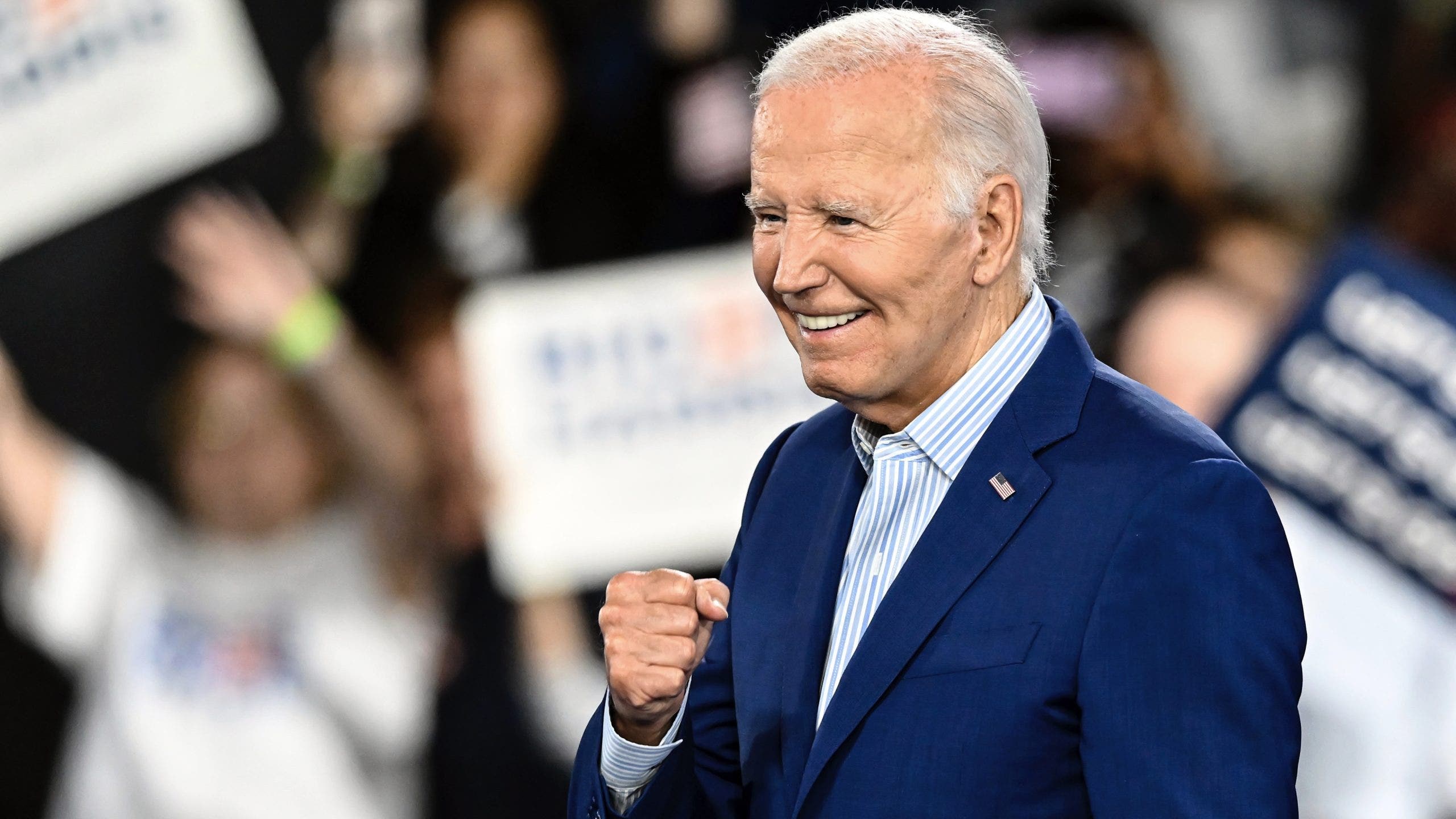
President Biden’s 2024 re-election campaign and the Democratic National Committee combined brought in over a quarter of a billion dollars in fundraising the past three months, Biden’s team announced early Tuesday.
And the campaign, in showcasing the $264 million raked in during the April-June second quarter of 2024 fundraising, noted that it pulled in $127 million in June alone, which it touted was the president’s best month of fundraising since he launched his re-election bid over a year ago.
The announcement comes as the Biden campaign tries to flip the script on a negative narrative coming out of last week’s first debate with former President Trump.
Biden’s June fundraising was up from the roughly $85 million the campaign and the DNC brought in during May. And the campaign spotlighted that their second quarter haul was $75 million more than they brought in during the first three months of the year.
BIDEN TRIES TO FLIP THE SCRIPT ON DISASTROUS NARRATIVE COMING OUT OF FIRST DEBATE
President Joe Biden reacts after speaking at a campaign rally in Raleigh, N.C., Friday, June. 28, 2024. (AP Photo/Matt Kelley) (AP Photo/Matt Kelley)
They also touted that they had a whopping $240 million cash-on-hand as of the end of June, up from $212 million a month earlier.
A sizable chunk of June’s haul was raked in at a star-studded fundraiser in Los Angeles with former President Obama, Hollywood heavyweights George Clooney and Julia Roberts, and late night TV talk show host Jimmy Kimmel. The campaign said after the event that it set a new Democratic Party fundraising record with a $30 million haul.
DEMOCRATIC NOMINATION OF BIDEN IN VIRTUAL ROLL CALL COULD COME AS EARLY AS THIS MONTH
The president also brought in over $8 million a few days later at a fundraiser at the Northern Virginia home of former Gov. Terry McAuliffe, where Biden was also joined by former President Bill Clinton and former Secretary of State and former Sen. Hillary Clinton, who was the Democrats’ 2016 standard-bearer.
But boosting the June fundraising to higher heights was the $33 million the campaign says was raised last Thursday through Saturday, the day of the first presidential debate and the following two days. And the Biden campaign showcased that their single best hour of fundraising this cycle came during the 11pm to midnight eastern hour on Thursday, immediately after the end of the debate with Trump in Atlanta, Georgia.
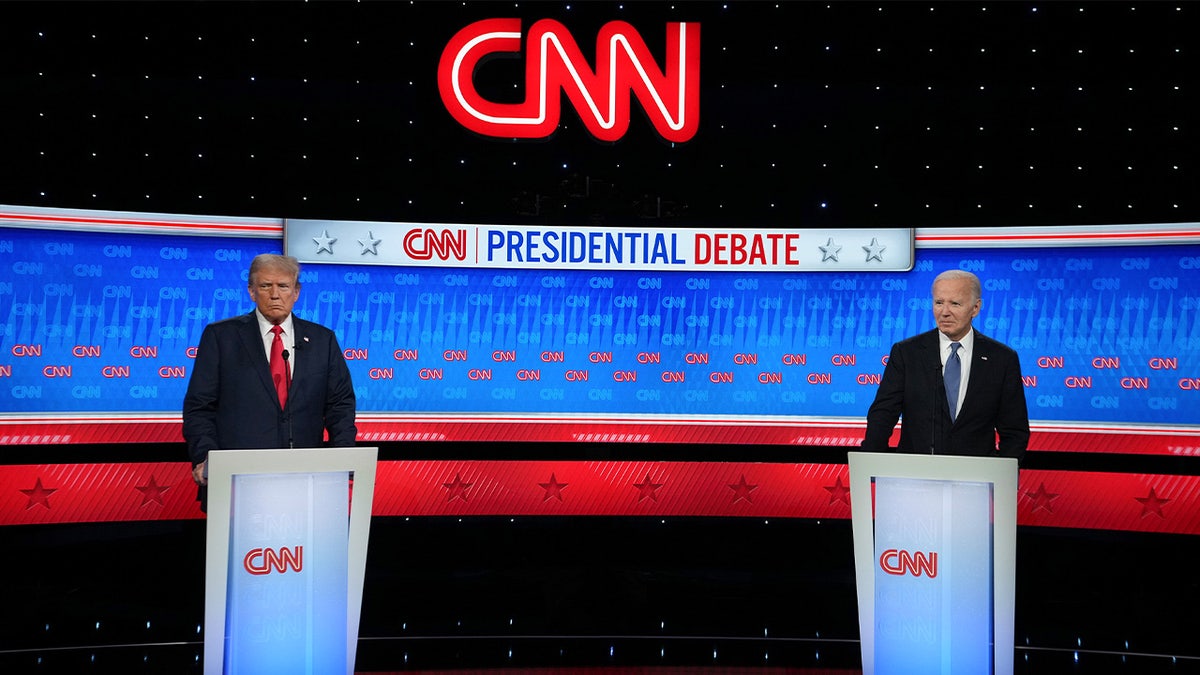
President Joe Biden (right) and former President Donald Trump participate in their first of two 2024 general election debates, on June 27, 2024 in Atlanta, Georgia. (Andrew Harnik/Getty Images)
The Biden campaign has been spotlighting its pre- and post-debate fundraising as it aims to alter the brutal conversation coming out of last week’s showdown. This, after the 81-year-old president’s halting delivery and stumbling answers at the debate sparked widespread panic in the Democratic Party and spurred calls from political pundits, editorial writers, and some party politicians and donors, for Biden to step aside as the party’s 2024 nominee.
The campaign also showcased its grassroots appeal, noting that nearly two-thirds of June’s haul came from small-dollar donors and that more than $30 million of the $38 million raised during the final few days of the month came from grassroots contributors.
“Our Q2 fundraising haul is a testament to the committed and growing base of supporters standing firmly behind the President and Vice President and clear evidence that our voters understand the choice in this election between President Biden fighting for the American people and Donald Trump fighting for himself as a convicted felon,” Biden campaign manager Julie Chavez Rodriguez said in a statement.

President Joe Biden and First Lady Jill Biden walk off the stage after a campaign event in Raleigh, North Carolina, on June 28, 2024. (MANDEL NGAN/AFP via Getty Images)
DNC chair Jaime Harrison noted that “grassroots donors across the country are chipping in every day because they know that this election will determine the course of history.”
In announcing their May fundraising figures, the Biden campaign waited until June 20, the final day the presidential campaigns had to file their monthly fundraising figures with the Federal Election Commission (FEC).
But when it came to announcing their June and second quarter figures, the Biden campaign wasted no time in showcasing their numbers, announcing them just two days after the fundraising period ended.
Biden and the DNC enjoyed a large fundraising lead over Trump and the Republican National Committee earlier this year. But Trump and the RNC topped Biden and the DNC in fundraising for the first time in April.
And in May, the Trump campaign and the RNC, fueled in part by a fundraising surge following the former president’s history-making guilty verdicts in his criminal trial, combined hauled in a stunning $141 million, easily besting Biden and the DNC.

Former President Donald Trump walks offstage after giving remarks at a rally at Greenbrier Farms on June 28, 2024, in Chesapeake, Virginia. (Anna Moneymaker/Getty Images)
The Trump campaign has until later this month to file its fundraising figures with the FEC and has yet to announce its June and second quarter hauls.
Fundraising, along with public opinion polling, is a key metric used to measure the strength of a candidate and their campaign. Money raised can be used to build up grassroots outreach and get-out-the-vote operations, staffing, travel and ads, among other things.
The Biden campaign has been using its funds to build up what appears to be a very formidable ground operation in the key battleground states and announced two weeks ago that they had hired their 1,000th staffer and had opened over 200 coordinated offices in the swing states. The Biden campaign enjoys a large organizational advantage over the Trump campaign when it comes to grassroots outreach and get-out-the-vote ground game efforts in the states that will likely decide the outcome of the election rematch.
“Team Biden-Harris grew its historic war chest while also significantly expanding its footprint and operations both in HQ and across the key states – the resources needed to win a close election,” the campaign highlighted in a release.
Get the latest updates from the 2024 campaign trail, exclusive interviews and more at our Fox News Digital election hub.
Politics
Biden denounces immunity ruling amid Democrats' doubts that he can beat Trump
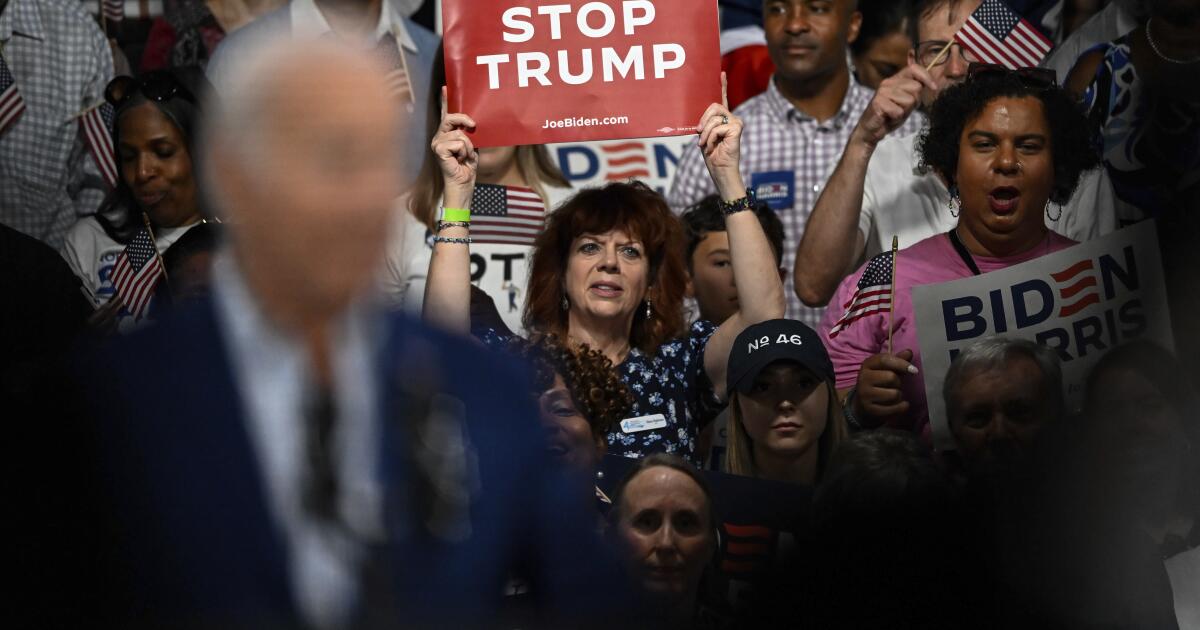
Monday’s Supreme Court decision giving Donald Trump immunity for past and potentially future presidential acts gave Democrats more urgency to defeat him, just as new polling showed that last week’s debate intensified voters’ concerns that President Biden may not be the man to do it.
The dueling pieces of news underscored the conundrum the party has been staring down for months: Evidence that Trump will have unchecked power in a potential second term energizes the Democratic base. But the increasingly high import of the election makes the choice to stick with Biden appear all the more risky.
“You can’t afford to lose,” said Mark Buell, an influential Bay Area Democratic donor and fundraiser. “In either case, you’re still down to the risk assessment of who has a better chance — another candidate or Biden?”
In a brief televised address at the White House on Monday night, Biden said the Supreme Court decision on immunity meant “there are virtually no limits” on a president’s actions. “This is a fundamentally new principle. And it’s a dangerous precedent.”
He said the public had a “right to know” Trump’s role in the Jan. 6, 2021, insurrection, though a trial probably will not take place before the November election.
“I know I will respect the limits of presidential power as I have for the 3½ years, but any president, including Donald Trump, will now be free to ignore the law,” he said.
In denouncing the 6-3 decision, Biden concluded by saying, “May God preserve our democracy.”
Mark Gonzalez, the recently departed Los Angeles County Democratic Party chair and California state director for Biden’s 2020 campaign, said he spent the weekend calming nerves of fellow Democrats. The ruling Monday only reaffirmed the stakes to people who were concerned about Biden’s fitness for the job and poor political standing, he said. A CBS poll released Sunday showed a growing share of voters — 72% — say Biden does not have the cognitive ability to serve as president, compared with 49% who say that about Trump.
“The reality is that, whether they’re a delegate or an activist or a $5 donor, they’re afraid,” Gonzalez said of the people he spoke with over the weekend. “They are scared that we need a stronger person to represent the Democratic Party so that we can prevail in November.”
Gonzalez said Monday “is a good reminder that we need to be able to … be prepared, and know that the other side is going to do everything that they can to take us down. We cannot afford to lose democracy because of mistakes at this one debate.”
The Biden campaign scheduled a media call within minutes of Monday’s ruling in hopes of shifting attention from the president’s poor debate performance on Thursday to Trump, whom they characterized as a singular threat to democracy. The ruling that he could not face prosecution for official acts would only embolden him to carry out threats to prosecute enemies and act like a dictator on his first day in office if he wins a second term, officials argued.
“This is not a drill,” said Harry Dunn, a police officer who defended the Capitol on Jan. 6 and has become a surrogate for Democrats. “Donald Trump is the single greatest threat to the United States of America in a generation. We can’t let him anywhere near the Oval Office again.”
Quentin Fulks, principal deputy campaign manager for Biden-Harris 2024, pointed to a new Jan. 6-focused advertisement the campaign released Monday and to heightened efforts to organize volunteers in battleground states.
But many Democrats have urged the president to appear at more rallies and give more adversarial media interviews to demonstrate his vitality. Fulks, asked during the call whether Biden had any plans to increase his public engagement schedule with town halls and other unscripted encounters, said he had no changes to announce.
A USA Today poll conducted Friday through Sunday found 54% of registered voters want Biden to be replaced as the nominee, compared with 37% who want him on the ballot. For Trump, the split was 51% to 46% in favor of removing him from the ballot, despite Trump’s record as a convicted felon who remains unwilling to concede that he lost the 2020 election.
Trump, 78, had stronger support within his own party than Biden, 81, did in his. The best news for Biden is that the question was a virtual tie among independent voters — with 64% saying they wanted Biden replaced and 63% wanting Trump replaced.
Despite growing concerns among allies, Biden has shown no signs he is willing to step aside and party rules would make it almost impossible to remove him from the ballot without his consent. A source familiar with a weekend Biden family summit held at Camp David confirmed reporting that the president’s family is determined that he remain in the race, calling it “a united front.”
Buell, who has been vocal about the need to assess swing state polls in the coming days, believes there is still a chance Biden would agree to withdraw if the data suggest it’s the best way to defeat Trump.
“The people around Biden, they may privately see it that way, but publicly of course they’re all singing the song that he’s fine,” Buell said. “And I think they have to until such time as he says he wants to pull the plug.”
Still, some of the party faithful are undaunted. Susan Reina, an activist in the Antelope Valley who oversees voter registration efforts in a competitive congressional district, said it was essential to remind voters that it comes down to a binary choice. Division within the Democratic Party plays into the hands of Republicans who have circled the wagons around Trump, she said.
Monday’s court decision gave Trump yet another political advantage. It all but guaranteed delay past November of Trump’s trial on accusations that he and his political associates worked to subvert the 2020 election.
For Reina and others, this means that beating the former president at the ballot box is even more essential “so that we in this country have the freedoms that we have today.”
This article includes reporting from the Associated Press. Bierman reported from Washington, Oreskes from Los Angeles.
Politics
Video: Supreme Court’s Immunity Decision Sets ‘Dangerous Precedent,’ Biden Says

new video loaded: Supreme Court’s Immunity Decision Sets ‘Dangerous Precedent,’ Biden Says
transcript
transcript
Supreme Court’s Immunity Decision Sets ‘Dangerous Precedent,’ Biden Says
President Biden spoke after the Supreme Court’s ruling that former President Donald J. Trump is entitled to substantial immunity from prosecution on charges of trying to overturn the 2020 election.
-
No one, no one is above the law, not even the president of the United States. But today’s Supreme Court decision on presidential immunity, that fundamentally changed. For all, for all practical purposes, today’s decision almost certainly means that there are virtually no limits on what the president can do. This is a fundamentally new principle and it’s a dangerous precedent, because the power of the office will no longer be constrained by the law, even including the Supreme Court of the United States. The only limits will be self imposed by the president alone. Now, the American people will have to do what the courts should have been willing to do, but would not. The American people have to render a judgment about Donald Trump’s behavior. The American people must decide, do they want to entrust the president once again — the presidency — to Donald Trump now knowing he’ll be even more emboldened to do whatever he pleases whenever he wants to do it.
Recent episodes in 2024 Elections
-

 News1 week ago
News1 week agoA Florida family is suing NASA after a piece of space debris crashed through their home
-

 World1 week ago
World1 week agoIsrael accepts bilateral meeting with EU, but with conditions
-

 World1 week ago
World1 week agoNew Caledonia independence activists sent to France for detention
-

 News1 week ago
News1 week agoArkansas police confirm 4th victim died in grocery store shooting
-

 World1 week ago
World1 week agoNetanyahu says war will continue even if ceasefire deal agreed with Hamas
-

 Movie Reviews1 week ago
Movie Reviews1 week agoFilm Review: Everyday of the Dead (2023) by Yuyuma Naoki
-
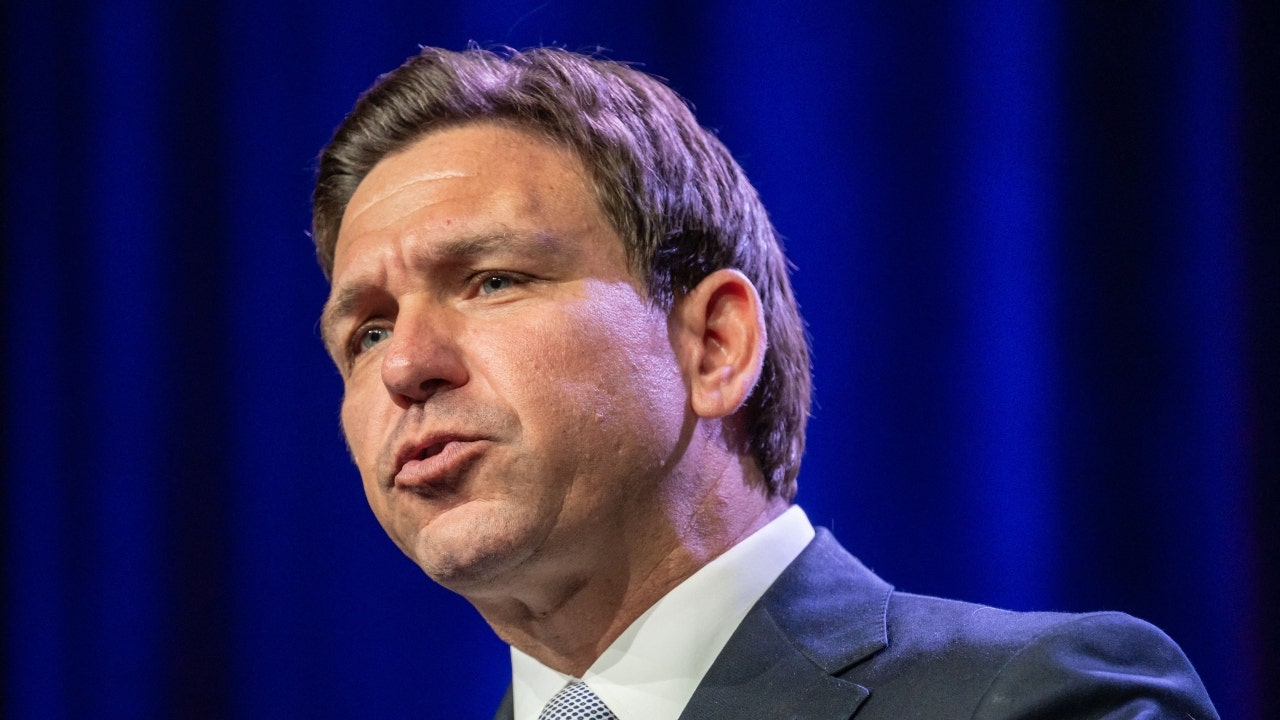
 Politics1 week ago
Politics1 week agoDeSantis signs bill allowing residents to kill bears, vetoes bill that fines slow left lane drivers
-

 Politics1 week ago
Politics1 week agoBiden official says past social media posts don’t reflect ‘current views,’ vows to support admin ‘agenda’












